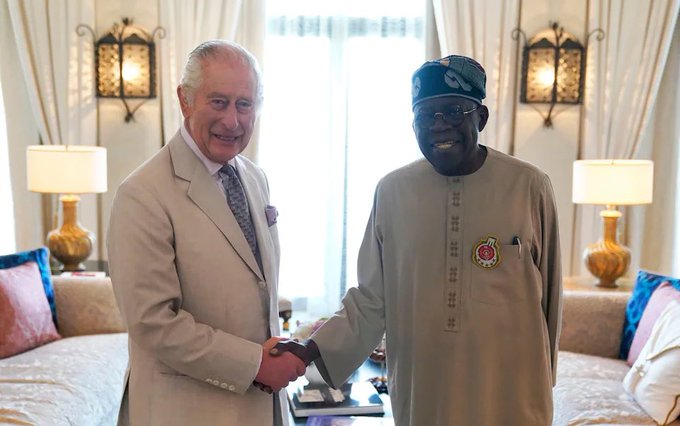

President Tinubu and King Charles
By BOLA TINUBU
The Commonwealth is more relevant today than it has been in decades.
If there wasn’t this global alliance of mostly English-speaking nations based on common law principles, there would be a need to create one.
Commonwealth leaders are meeting this week on the island of Samoa for our bi-annual summit. Intense discussion over free and fair trade, security, and climate action are occupying us 56 members – all friends and allies.
If an alliance of primarily English-speaking nations rooted in common law and shared commitment to global rules didn’t exist, one would need to be created. Like-minded countries would naturally come together to amplify their values while also providing a mechanism to lend collective heft to the individual economic and geopolitical interests of each member.
The world already has such an organisation, and its bi-annual leadership forum – the Commonwealth Heads of Government Meeting (CHOGM) – is it. Yet, every two years like clockwork, the usual, ill-informed questions about the purpose and future of this oldest international organisation of partner nations appear: How can it survive its members becoming republics? What is the purpose of an institution that is neither a single market nor a regional political union?
The organisation’s demise has been predicted for decades, mostly because of the misunderstanding that becoming a republic means Commonwealth exit. Quite the opposite: it is in fact a path most members have trod.
When Nigeria became independent in 1960, the Commonwealth comprised ten member nations, three of which were republics. Nigeria became a member upon independence and then the fourth republic in 1963 – transitioning from retaining the late Queen as head of state to an elected presidency. Today, the Commonwealth boasts fifty-six members, of which two-thirds are republics. A few more would hardly rock the boat.
History aside, today the Commonwealth is more relevant than it has been in decades. The world is moving beyond regional trade and governance blocs, shifting towards global networks of nations with shared interests across regions and hemispheres.
The Comprehensive and Progressive Agreement for Trans-Pacific Partnership (CPTPP) – spanning the Americas and Asia, and with the accession of the UK, Europe and binding 12 countries in a trade-based pact – is one example; the Alliance for Small Island States (AOSIS), an intergovernmental organisation of low-lying coastal and small island countries, comprising 39 nations stretching across all corners of the globe is another. Though one is for trade, the other for political salience, both are based not on geography but on a common interest – the convening principle for which the Commonwealth is the original item.
Tinubu: My focus not on 2027 election
While multi-continental, global networks are back in favour, that doesn’t mean the Commonwealth could not benefit from a rethink. As President of the Commonwealth’s second most populous state, I believe more can and should be done together on economic cooperation and mutual political support.
Nigeria would like to see more significant intra-Commonwealth trade, an opportunity in we have collectively underachieved as an alliance. Take Africa. Twenty-one of the continent’s countries are also Commonwealth member nations. All are members of the African Continental Free Trade Agreement (AfCFTA), a 54-country continent-wide free trade zone.
Bi-lateral agreements between AfCFTA and leading Commonwealth economies such as the UK, India, and Australia would create a web of interlinked trade agreements among Commonwealth nations, driving closer cooperation and deeper integration across the Commonwealth. Britain has proposed a UK-AfCFTA trade agreement. Others should follow.
Nigeria urges larger Commonwealth economies to prioritise importing materials and foodstuffs from African Commonwealth nations. Supported by bilateral trade agreements, there’s no reason why African coffee or fresh produce couldn’t be offered to Western Commonwealth members at preferential rates in exchange for investment in local processing industries. This would not only integrate our economies but also provide nations like Britain with affordable products they can’t grow while creating jobs in Africa – reducing the need for migration by offering better opportunities at home.
Nigeria and all African nations seek Commonwealth support for a bid for permanent representation on the United Nations Security Council. Africa remains the only continent without a permanent seat on this crucial global decision-making body, even though it has been the subject of 70 per cent of its resolutions since the end of the Cold War. Africa remains a constant focus of the Security Council yet lacks a constant say.
The Commonwealth has finally begun caucusing as a group at the United Nations, a development that surprisingly only became official a few years ago. While not every vote is or should be taken as a bloc, one thing is clear: securing an African seat on the UN Security Council with Commonwealth backing would supercharge the relevance of our 56-country family. This move would decisively prove the Commonwealth’s importance and silence doubts about its future.
Far from done, the Commonwealth’s time has come.
*Tinubu is the president of the Federal Republic of Nigeria
A former Harvard Medical School morgue manager, Cedric Lodge, accused of stealing and selling organs…
One person has been confirmed dead in a building collapse in the Ojodu-Berger area of…
The Minister of the Federal Capital Territory (FCT), Nyesom Wike, says the FCT Administration is…
The Lagos State Emergency Management Agency (LASEMA) says it has rescued eight persons from a…
A yet-to-be-ascertained number of persons have been trapped after a building on Oremeta street in…
The Joint Admission and Matriculation Board (JAMB) has stated that its 2025 Unified Tertiary Matriculation…
This website uses cookies.